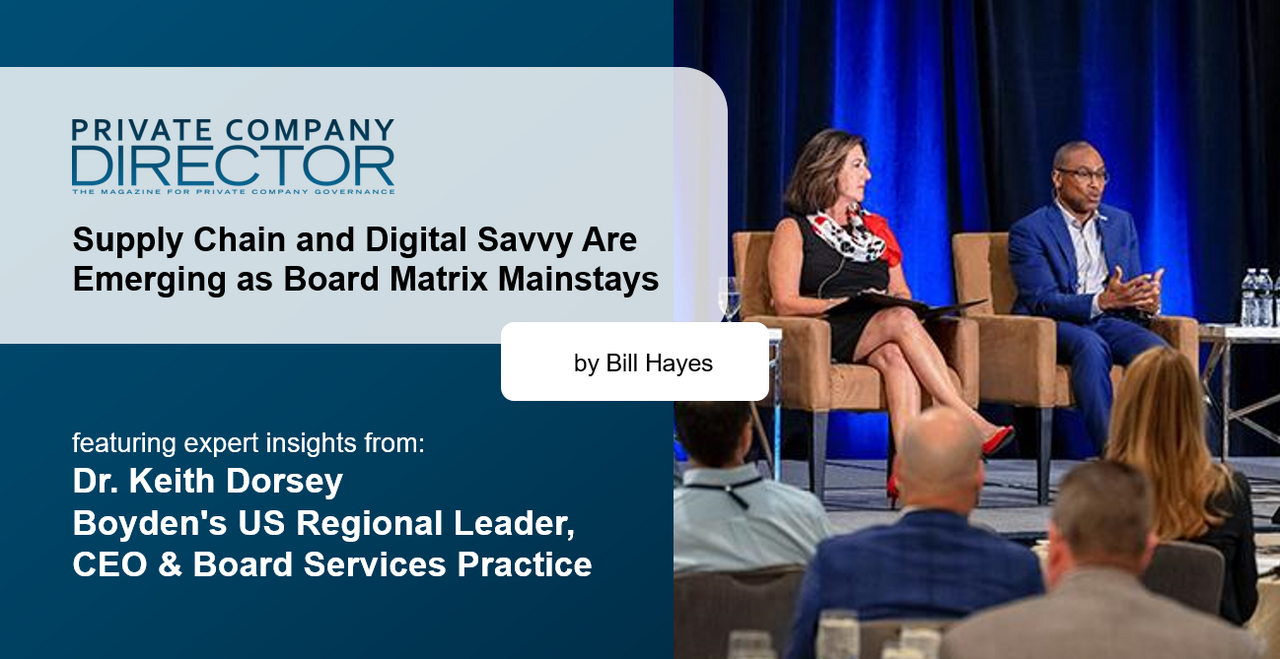Featuring Boyden's Keith D. Dorsey, EdD, read about the vital aspects needed to create a board that aligns best with business strategy
This article originally appeared in Private Company Director and is reprinted with permission of MLR Media. Click here to view the original article.

Creating the right board for your company is about finding the right directors, the right personalities and the right rapport. But it is also about finding the right skills. It’s a recipe that Diane Adams, independent board director of Valco Industries Inc., Thrall Enterprises Inc. and Lodge Cast Iron, has sought to perfect throughout her time as a board member. One of the tools she uses to try and hit that sweet spot is the board matrix.
“I would say to look at your board first. What we have done is prioritize the skills for what we need today, but the skills and experiences that we think we are going to need in the future. And then we add another layer into that, which is the personal characteristics and values. Then you add onto that things like diversity, tenure and age, so you end up with a three-dimensional matrix. Once you put that together and assess your current board, it will likely identify some gaps that will help in the recruitment and refreshment of your board moving forward.”
If building an ideal board for a private company sounds a little bit like baking a cake, then a private company board is a pound cake and a family company board is a seven-layer cake. It’s a whole other animal, stirred on by factors like family members vs. independents and the emergence of new generations.
Says Adams, “When you look at that, it’s a very dynamic matrix and it evolves over time. You have to look out five years and say, ‘Who’s going to be ready, and who’s moving out?’ And then how are you preparing them and how are you training and developing the next generation?”
When he is not serving as a board member of Vimly Benefit Solutions or as an executive board member of Fast Company, Dr. Keith D. Dorsey serves as managing partner and U.S. practice leader, CEO and board services, of Boyden, and as part of his work he counsels directors to follow the words of Albert Einstein.
“One of the things that I challenge people to do is remember the definition of insanity is doing the same things over and over and expecting different results, and then stop and reflect on why you do the things you do and why you are recruiting the people you recruit for boards today,” says Dorsey. “Is your recruiting aligned with your business strategy?”
Dorsey likens the process of aligning the board’s expertise with its business strategy to looking at an iceberg, with the skill sets and professional background being what you see above the surface. As for what lies beneath the water, that would be the director’s personal attributes, such as intellectual curiosity, courage, accountability, judgment and emotional intelligence. And when it comes to particular skills that are beginning to become higher in demand on boards, Dorsey ticks off some of the suspects that have become more usual in recent years (cybersecurity, geopolitical expertise), but saves particular attention for supply chain knowledge.
Citing developments that have become more urgent because of the COVID pandemic and the war in Ukraine, Dorsey says, “We now know that the supply chain can be disrupted just like that. I’m starting to see individuals that are coming from chief procurement officer type roles being appointed to boards.”
The legal profession is another area that is finding the doors to the boardroom opening. Says Dorsey, “For a long period of time, legal professionals, whether they’re general counsel or other legal executives, weren’t brought onto boards. But now, because of risk mitigation and the need to bone up in that area, legal professionals are much more common in the marketplace.”
As for Adams, she mentions the aforementioned cybersecurity expertise as a valuable and emerging skill for private company boards but stresses that the knowledge base should be broadened to include digital chops in general, across all functional areas, including marketing, customer service and operations.
“If you can find people with digital expertise, they can help to reduce your overall enterprise risk, improve your planning function and customer relationships and ultimately provide great value to the company. We’re having conversations about digital analytics on my boards as an ongoing discussion point. Digital transformation is going to be critical, and it leads itself naturally in some cases to diversity, because when you look at these different skill sets, you can search from a global pool of candidates.”
Digital experience is something that can also be found in abundance on the boards of family companies, only it can take some persuading for fellow family members to recognize the value. In her experience on family boards, Adams has found that independent directors sometimes see the benefit that younger generations can bring before their family members do.
“The younger generations bring a different thought perspective. They bring up different topics, and they’re very savvy with their social media. The independents directors tend to look at each of the family members as individuals, but the family doesn’t always look at each other like that. They say, ‘Well, they’re the kids.’ But they’re really not kids. They’re young professionals, and they’re smart and savvy. Finding ways to have their voice be heard is critically important. If you’re working in a private company or on a family board, you really need to be cognizant of that.”



